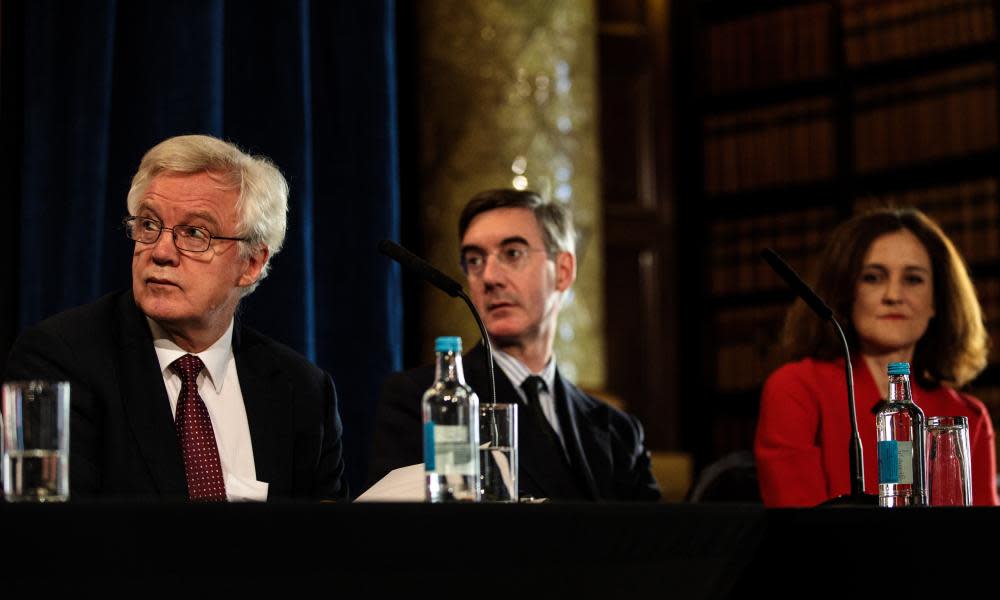Hard Brexiters’ new plan gets A+ for idiocy

Take two. A fortnight ago, Jacob Rees-Mogg, David Davis, Steve Baker, Boris Johnson and other leading members of the European Research Group squeezed themselves into a Westminster committee room to share their excitement at having found a single economist who was optimistic about Brexit. Here was the way forward. Ignore the doom-mongers, just crash out of the EU on World Trade Organization terms and the UK would be more than £1tn better off. Happy days all round.
Until today, when many of the usual suspects – with the exception of Boris, who tweeted his undying solidarity with anything and anyone that helped him become Tory leader – rattled around in a barely half full Gladstone library of the Liberal Club to tell a handful of reporters that – much to their surprise – they had found a second economist who was tremendously enthusiastic about Brexit. Only he had come up with a completely different model – something more akin to a Canada-style trade deal – so that’s what they were now endorsing. Fickle doesn’t begin to describe them. Though simple-minded might.
Shanker Singham, the author of the IEA’s “Plan A+”, was introduced as the country’s leading trade lawyer. Which rather suggested there can’t be much competition for that coveted title, as Singham immediately did his best to live down to expectations. The problem with the Brexit negotiations so far, he declared confidently, was that we had been treating them as a problem singular to the UK and the EU. Silly, silly us. His reasoning was all to be found in footnote 28 on page 37 of his report. Which didn’t appear to exist.
What we should have been doing is signing loads of other trade deals with the US and the rest of the world behind the EU’s back – the US was apparently just gagging to do deals before it knew what final trade arrangement we had agreed with the EU – because the EU would definitely never have found out was going on and pointed out its illegality, said the country’s leading trade lawyer, failing to grasp the basics of international trade.
As if to prove he really was as stupid as he sounded, Singham went on to suggest that post-Brexit, the UK might do some individual trade deals with separate EU countries. He concluded by saying that deregulation was the way forward – British workers deserved the same rights to be crushed to death by collapsing buildings as their counterparts in Bangladesh – and that Brexit could make the whole world about 10% richer. After several decades in which everyone was at least 10% poorer.
The four politicians on the panel heroically maintained the idiocy quotient. The former Labour MP Gisela Stuart excelled herself by claiming that Brexit was actually a game of four-dimensional chess and we needed negotiators who could rise above the two-dimensional. Which rather ruled out everyone on the panel as you wouldn’t trust any of them not to lose a game of draughts to a five-year-old.
Rees-Mogg loftily declared that he had already solved the problem of the Irish border in a previous presentation, that had been dismissed out of hand as fantasy by everyone who understands the issues, and so there was no reason why Theresa May shouldn’t immediately accept these new proposals as government policy. Other than the fact that even she recognised them to be unworkable. Which is saying something.
The last word went to David Davis, who can seldom resist the opportunity of saying something he will later regret. Most deals were really only finalised in the last 48 seconds, he insisted. Which explained both why he had invariably come off worse in all negotiations and why he had done almost nothing during his time as Brexit secretary. The possibility now has to be entertained that Davis has been an undercover agent for staying in the EU all along. It’s the only rational explanation.
If there is a third economist who thinks Brexit is going to benefit the UK, she wasn’t to be found in Liverpool, where the Labour party was going through massive contortions at its conference to find a way of keeping everyone happy. And pleasing no one. While everyone seemingly agreed Brexit was a terrible idea, the party leadership seemed to think the solution lay in only offering people a vote on a bad deal or an even worse deal. Clowns to the left, jokers to the right.

 Yahoo News
Yahoo News 
